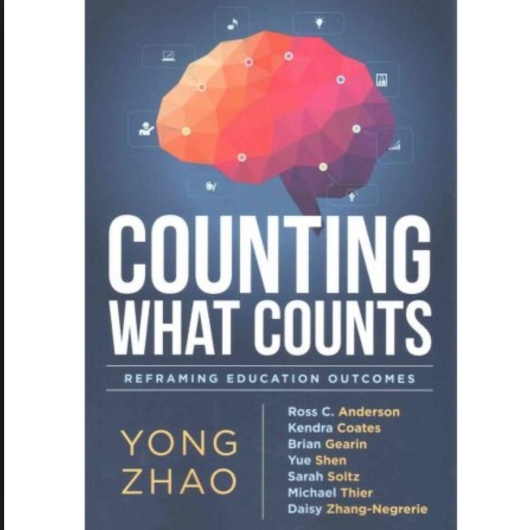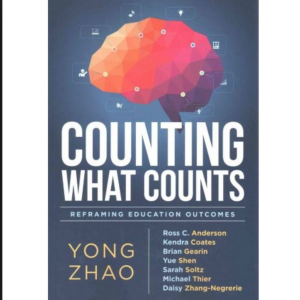
In our quest to assess and compare educational outcomes of students, teachers, schools, districts, states, and nations might we be losing sight of the characteristics of a fulfilling educational experience? Counting What Counts: Reframing Education Evaluation, a 2016 book edited by Yong Zhao, argues that this may be the case. He and his colleagues suggest ways to measure what matters so that we can create a more personalized, diverse, authentic, collaborative, and ultimately successful educational system. Zhao, a professor in the college of education at the University of Oregon and a professorial fellow at Victoria University in Australia, is a prolific writer of topics related to changes in education as a function of globalization and technology. Counting What Counts and other works of his like Who’s Afraid of the Big Bad Dragon will appeal to those disillusioned by America’s testing obsession, interested in developing students’ talents outside of just reading and math (e.g., in the arts or leadership), and concerned about creating an educational system that will prepare the members of our workforce with the skills they will need to make our economy prosper.
Zhao states that, as nations focus on improving standardized test scores, they may indeed produce better test takers. Yet, they may lose sight of their larger goal of creating a well-educated citizenry and diverse and functional work force. He and his colleagues explain that our current testing system is flawed in several ways. First, motivation and inter- and intra-personal skills matter tremendously for one’s success in life, but these skills are rarely tested. Second, thriving workforces have people with a diversity of interests, talents, and perspectives. Standardized testing, which creates a culture that values a homogenized student body, is counter-productive to creating the diverse workforce in which economies thrive (not to mention, in which individuals feel fulfilled by their ability to develop their natural strengths). In particular, in an era when we are able to spend more of our resources on goods that satisfy psychological, rather than physical, needs there is growing demand for traditionally undervalued skills, such as artistic skills. As such, we neglect at our own peril to cultivate these. Finally, standardized tests dampen creativity and entrepreneurship. They do not test skills that matter for innovation and success, such as working with people of other cultures, communicating with diverse others, thinking complexly about global challenges. They do not measure self-confidence, hopefulness, social capital, teamwork, conscientiousness, openness to new experiences, empathy, curiosity, and passion. Further, the limited skills that are measured by common standardized tests (e.g., IQ tests, SATs, PISA) are only marginally correlated with measures of long term success.
As flawed as current standardized testing schemes are, Zhao recognizes that testing is valuable and necessary for helping students succeed, holding educators and educational institutions accountable, and differentiating among students. As such, Zhao argues for overhauling current accountability systems. A redefined testing system might improve the quality of education that students receive. Throughout Counting What Counts, Zhao and his colleagues discuss the benefits and limitations of several alternative tools that could be used to measure some traits that matter for academic and personal success. He argues that changing the testing culture matters because some of the most important skills we hope to instill in students, such as creativity, may not need to be taught per se, but rather, students need to grow in a culture where those skills are valued.
Finally, Zhao concludes with a beautiful, idealistic vision for education and the role that changing assessment systems play in bring about that vision. He calls for a paradigm shift that: 1) values personalized education; 2) focuses on long-term success, rather than short-term measures of knowledge retention; 3) is mindful of unintended consequences that can result from focusing exclusively on particular outcomes; 4) assesses students in a way that is authentic to how they will use their knowledge and the skills they value; and 5) promotes collaboration among the assessors and the assessed, so that there is comprehensive consensus about whether what is being assessed matters. Although perhaps hard to realize, the educational vision Zhao articulates is one in which students are likely to thrive and feel fulfilled. We would be well served to work towards bringing about Zhao’s attractive vision for our educational system in order to support our students and our work force.
Zhao, Y. (Ed.). (2016). Counting what counts: Reframing education evaluation. Bloomington, IN: Solution Tree Press.






